July Carry On Review
July Carry On’s extremely adjustable handle and swivel wheels pave the way for a smooth trip, though a compression panel is unwieldy to flip out of the way.
Our Verdict
Save time. Get access to brief summaries of our reviews so you can browse and make decisions more efficiently.
Pros
- Rolls like a dream with minimal effort
- Included 10,000 mAh battery bank works well
- Telescoping handle stops at 20 spots so you can find the right fit
Cons
- Compression panel can be a bit unwieldy
- No expansion zipper in case you overpack
- Vegans should note there are a few leather accents
Technical Details
-
Capacity
42l
-
Weight (lb)
7.4 lb (3.4 kg)
For Original (with power bank and outer bumpers)
-
Weight (lb)
6.6 lb (3 kg)
For Essential (without power bank and inner bumpers)
-
Dimensions
21.5 in x 15 in x 8.5 in (54.6 x 38.1 x 21.6 cm)
-
Notable Materials
Polycarbonate, Nylon, Leather, YKK Zippers
-
Manufacturing Country
China
-
Warranty Information
Full Review
Whether you’re packing for vacation or a frequent traveler who prefers to pull your gear behind you instead of carrying a travel backpack, there are plenty of reasons to check out some rolling carry on luggage. To begin with, you may be able to zoom through the airport with your gear right at your side, and there’s a good chance that you’ll be able to bring more things on board while still meeting the carry on requirements of your airline.
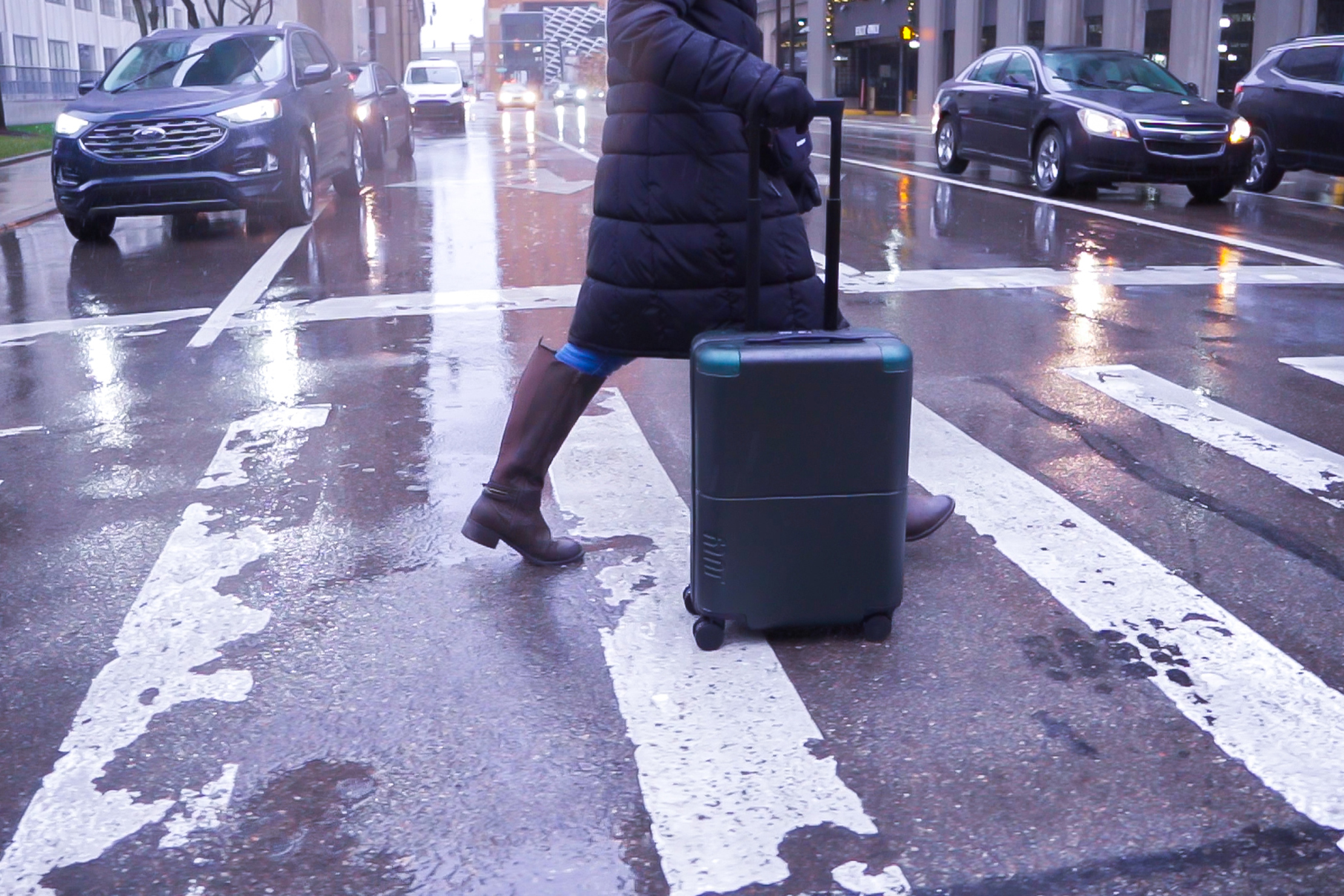
With four rolling wheels, a hard side to protect your gear, an external battery bank, and a telescoping handle, the July Carry On aims to be your next travel companion. The question is, will you want to bring it along or be left wanting more? Let’s dive into the details and find out!
External Components
If you take luggage on a plane, shouldn’t it be able to fly like the big boys? We’re not sure if that was the consideration, but the July Carry On has an aerospace-grade German polycarbonate shell capable of handling the bumps and drops of travel.
It also has metal bumpers on each corner to provide extra durability if the bag bumps up against the overhead bin, the back of a car trunk, or accidentally runs into the wall. It comes in two versions, and depending on the option you choose, the bumpers are either external or internal. Either way, we think it’s nice to have the extra structure, even on an already hard-sided bag, so you can be sure your gear is safe inside, even if the carry on is gate checked on an overbooked flight.
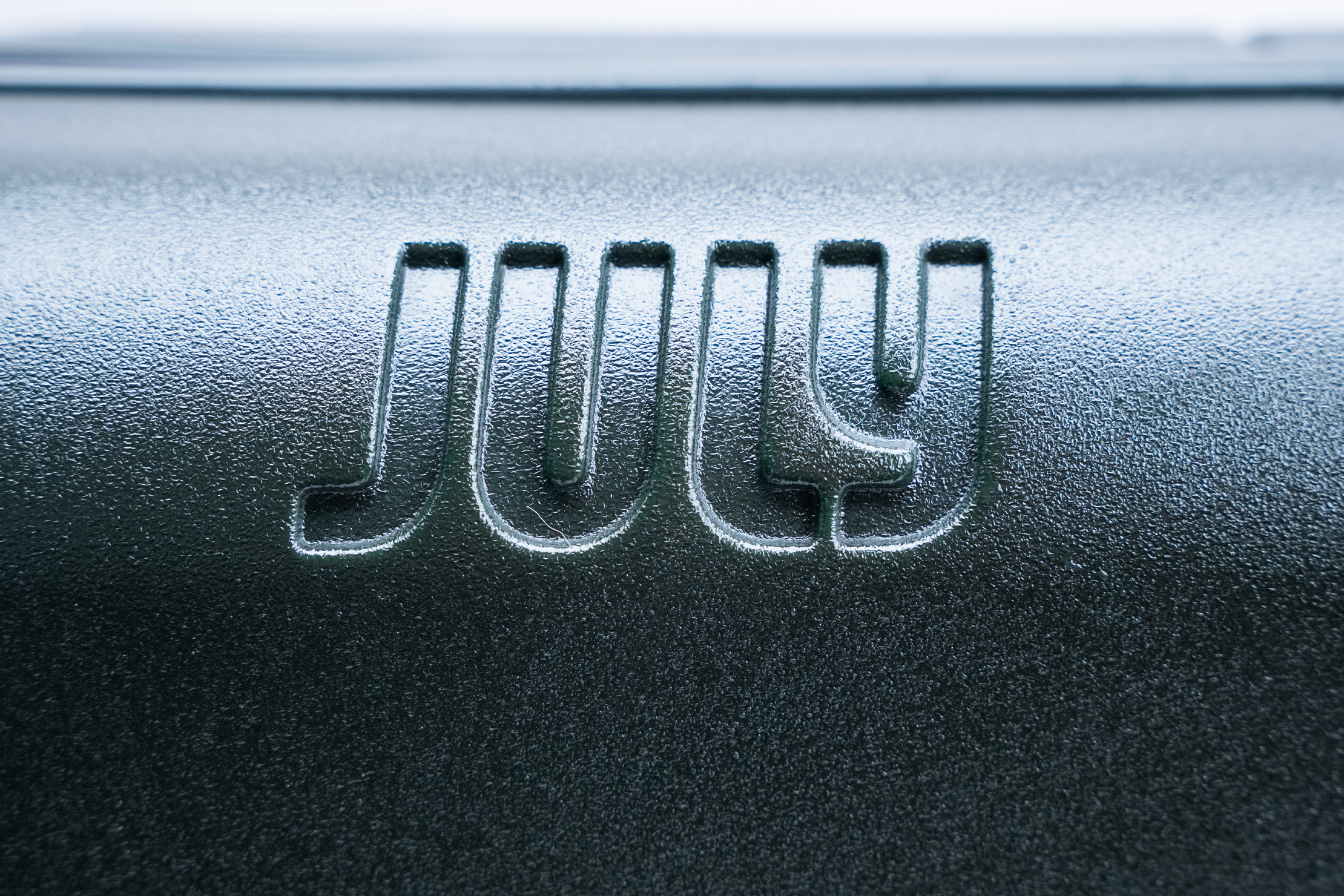
We’re rocking the Forest (green) colorway, which we loved on the July Carry All Backpack and like on this piece of luggage, as well. However, if you don’t love that verdant hue, don’t worry; there are nearly a dozen different colors to choose from. They’re primarily deep gem or neutral tones, and we like the darker colors because they hide dirt and scrapes, but you can also get it in Sand (beige), Monochrome (white), and perhaps another limited edition light colorway if that’s more your style. The July name is debossed near the bottom left corner of the front and back, and we dig the sizable yet subtle branding.
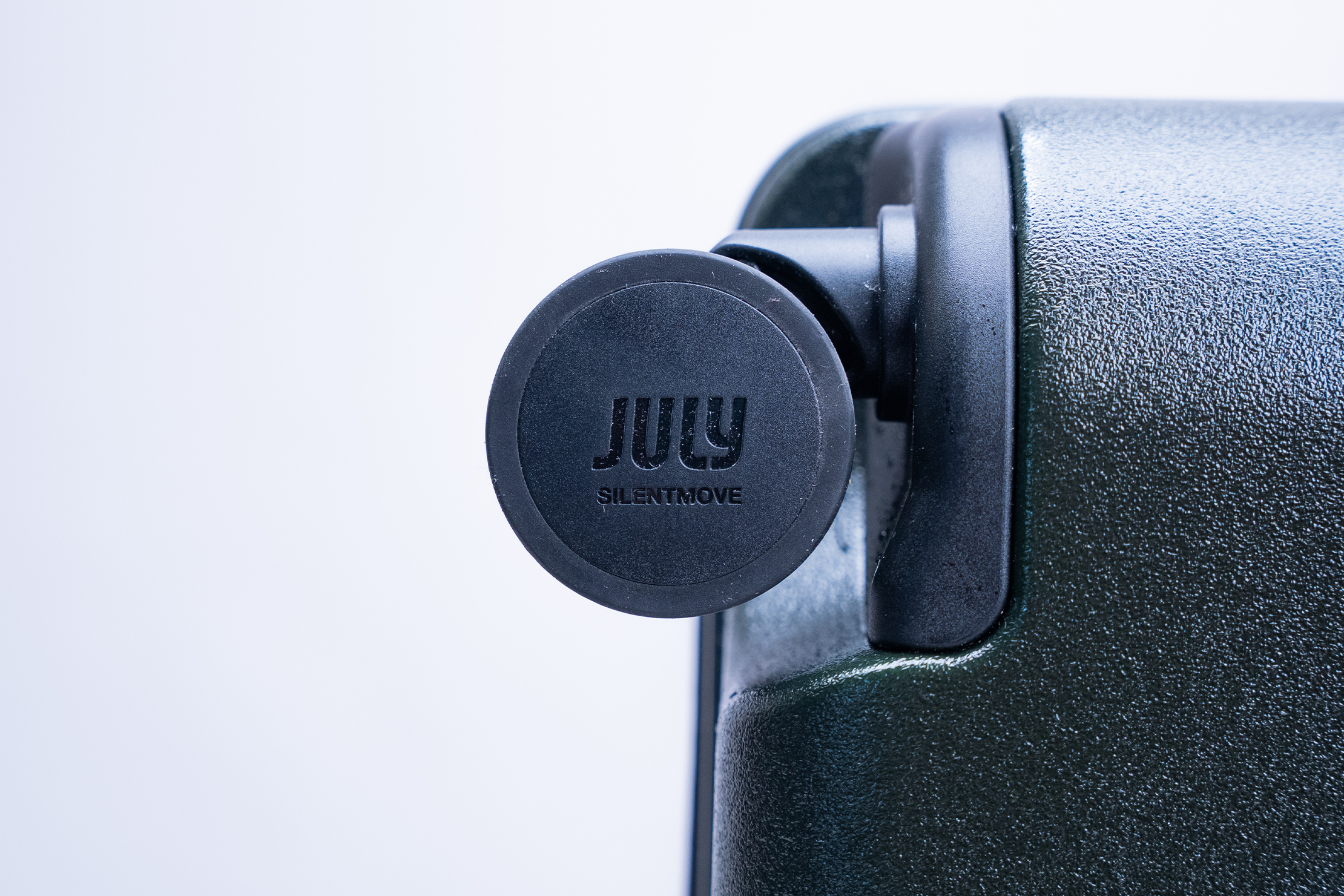
The bottom four corners of the July Carry On feature SilentMove™ wheels, which have a rubbery feel and move rather, well, silently. If you’re checking out in the wee hours of the morning and your friends aren’t leaving until the afternoon, they’ll appreciate the quiet (as long as you don’t trip and fall in a dark room). They swivel very well, so it’s easy to turn on a dime when rolling on all four wheels. If you pull it behind you on two wheels, there’s a slightly larger turning radius, but it still works very well. However, we prefer pushing it next to us on four wheels because it’s a near-frictionless experience.
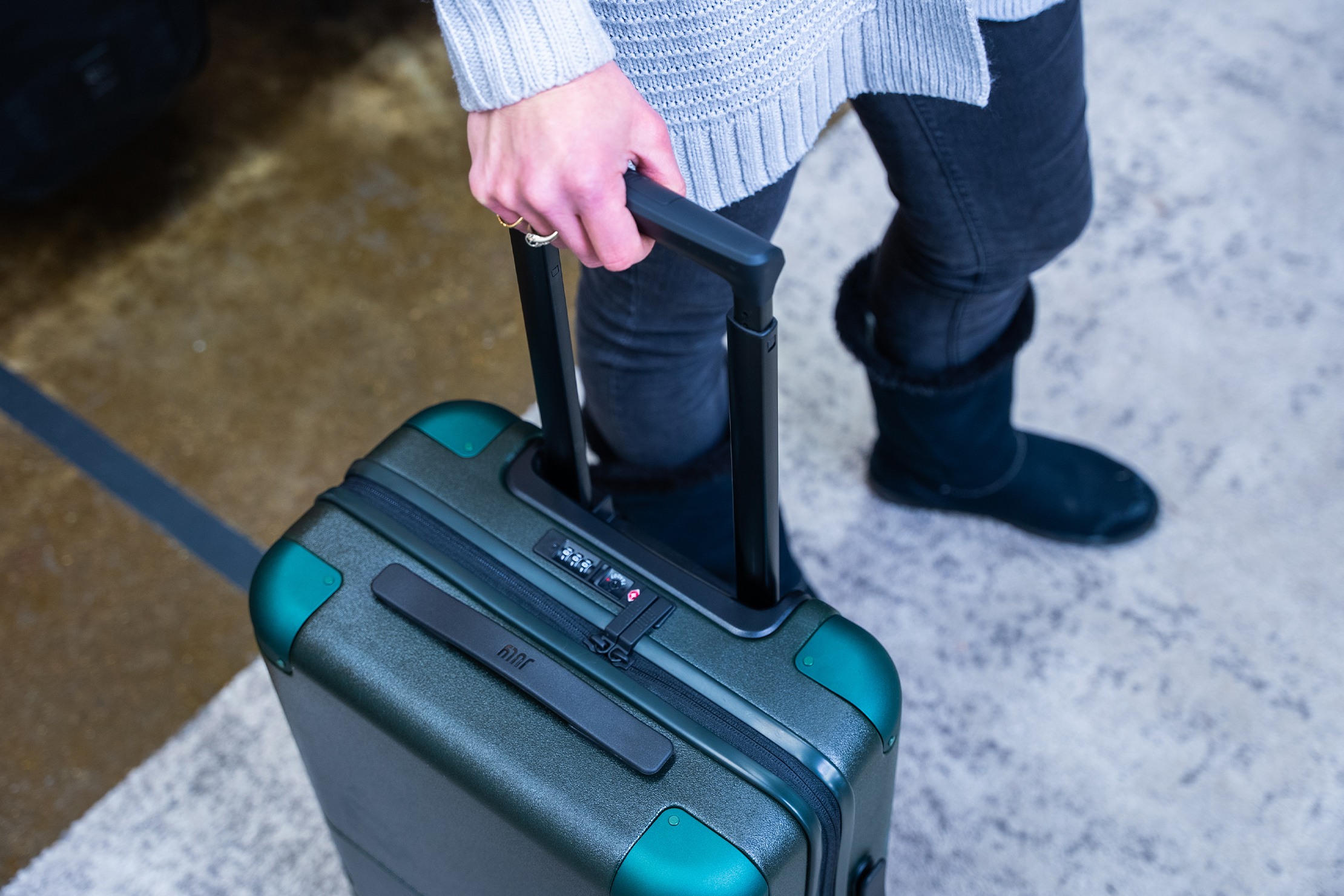
Whichever way you roll, the handle is super comfortable to hold. Its shape is straighter on the side facing away from you and curved closer to your body, so your hand naturally curls around nicely (the straighter edge is where your fingers wrap around). It’s the same soft, rubbery texture as the wheels and has the July brand name on a large button that you press to raise and lower the handle.
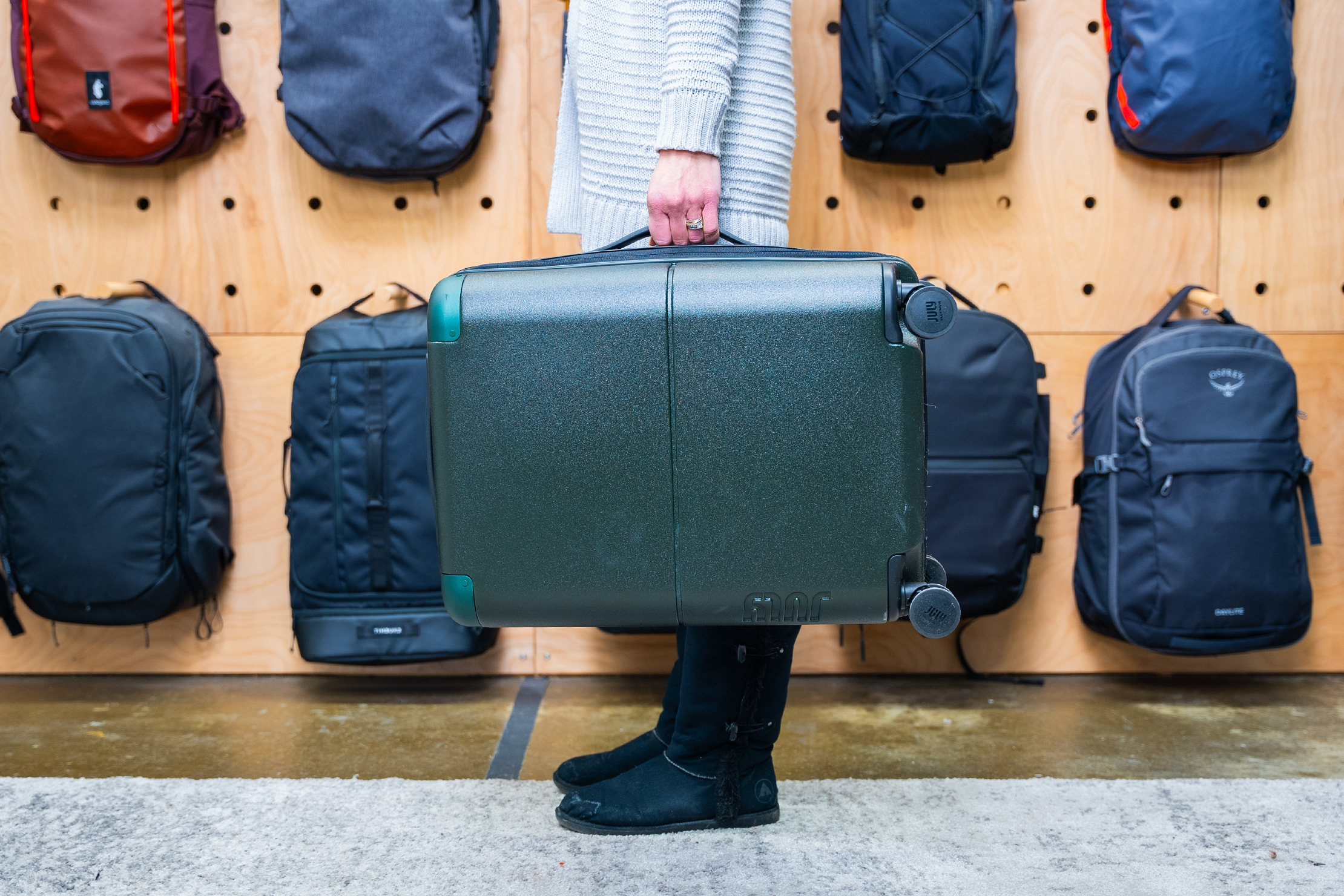
When you must heave your bag into the trunk, above your seat on the plane, or over a mud puddle, there are two handles: one on the top and one on the right side. They’re flexible and feel soft and rubbery, like the handle, so they’re nice alternatives when you can’t roll the Carry On along. Carrying it by the handles can get a little heavy after a while, but there are always times when you’ll need to pick up the bag, and while you could lift it by the telescoping handle in a pinch, that’s not what it’s designed for.
Speaking of the overhead bin, although this is a carry on bag (it’s right there in the name, after all!), it’s out of carry-on compliance for many airlines because of the extra inch of width. July says that its total linear dimensions of 115 cm are approved to fit as a carry on for all international standards, but Delta Airlines, for example, restricts that to 114 cm, with a width not to exceed 14 inches. Your mileage will vary depending on the gate agent and airline, but we have taken even bigger bags on some carriers like Delta and had no problem. Then again, you may get asked to gate-check your bag—and incur any potential cost if it’s over your airline’s size allowance—so we encourage you to check out the restrictions for your airline before you head out the door so that you’re not in for a nasty (read: expensive) surprise.
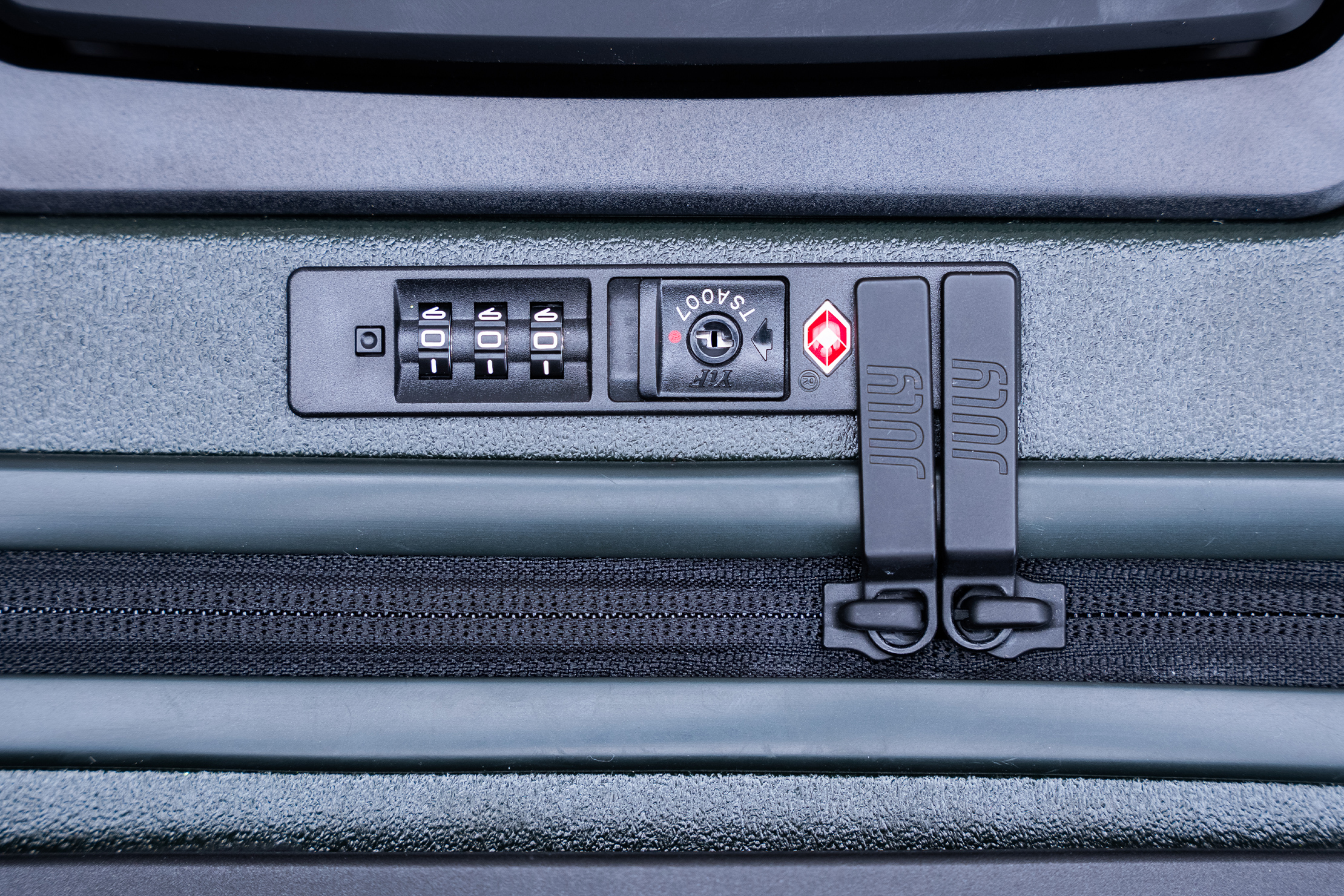
We were happy to see that July uses YKK zippers for the bag, and they function just as well as we’ve come to expect from the Japanese brand. These zippers click into a TSA-approved combination lock near the handle at the top of the bag. If you’re unfamiliar with integrated locks like these and have heard that you shouldn’t lock your luggage as it goes through security, let us explain. Security officers can override your combination with a special tool if they need to get into your bag. While this means that your lock isn’t nearly as secure, since you can, frankly, buy master keys online, it’s still an extra measure of protection for your gear. It will at least slow a dedicated thief down and perhaps deter someone just trying to pull zippers. Plus, we like measures like these because they keep your zipper from accidentally opening in transit if something snags the pull. However, you do have to remember to pull the two zipper pulls together and click them into the lock on the top to take advantage of this feature, and it’s a long way to zip one side when the bag has been open.
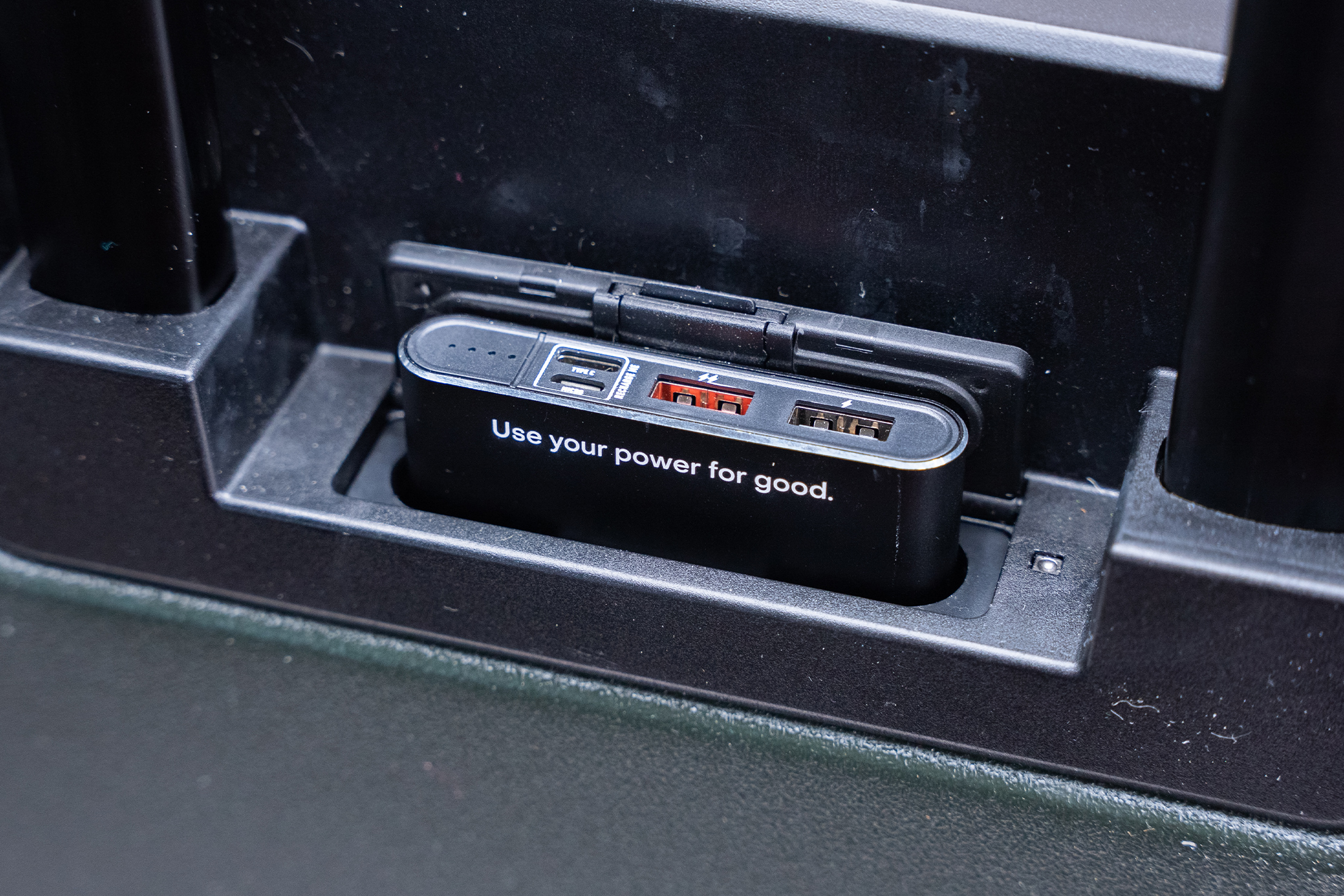
One more fun feature to cover before we move on—the integrated battery bank. As we alluded to above, July sells two versions of the Carry On: Original and Essential. We have the Original, and along with the exterior metal bumpers, it also comes with a 10,000 mAh battery bank embedded beneath the telescoping handle. Simply push the latch on the little hatch between the two poles, and it will pop open, revealing a way to charge your devices via USB-A or C. You can remove the power bank to carry at your destination, although it’s rather hefty. While it’s not our first choice because of its size and weight, it is nice to have that functionality built into your luggage, especially if you’re working remotely or have a long layover and are worried about running out of power while you wait for your flight.
It comes with a USB-A to USB-C cord but no wall charger. You can charge the bank itself using that or either Micro-USB. There’s even a helpful outline around those two outlets on the battery bank and the words “Recharge Me” so that you know exactly how to get more power. A button right next to those inputs has four LED lights that illuminate to let you know how much power is left. We have to mention, though, that it never quite looks like the fourth one is lit, no matter how long you charge it.
If you already have a battery bank or want to save a few bucks ($20 at the time of this review) and a few ounces of weight (6.6 pounds as opposed to 7.4 pounds for the Original), you can go for the Essential, which has internal bumpers and no battery bank.
Fit Notes
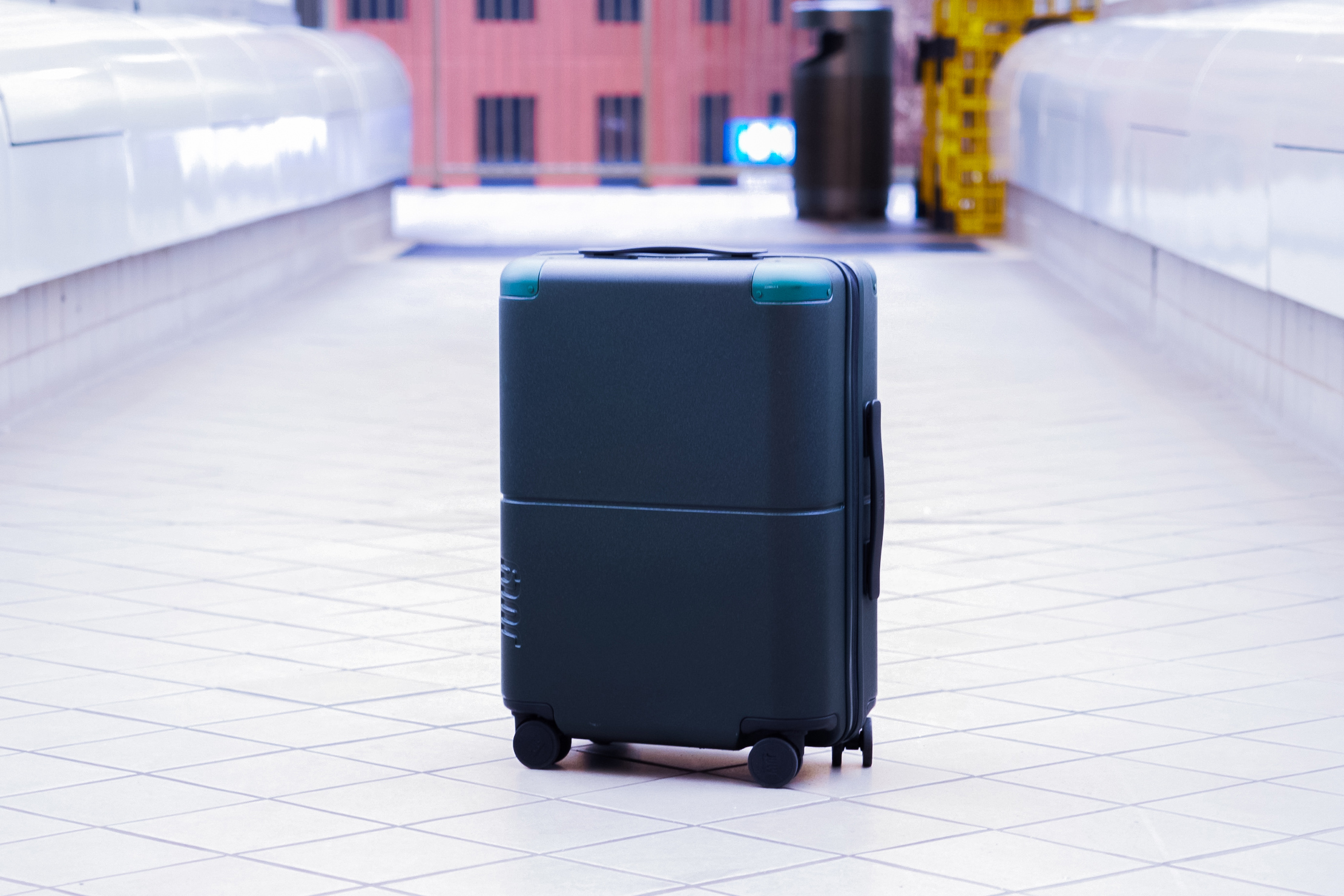
We’re happy to say that the July Carry On sails along quite nicely alongside you as you make your way through the airport. While you would hope that would be the case with any piece of rolling or spinner luggage, take a spin through Costco or the clearance rack at Kohls, and we think you’ll find some lacking in the “smooth as silk” rolling experience department. As mentioned earlier, we encourage you to take advantage of the four wheels and use them all at once, but you can also drag the suitcase behind you on two wheels if you prefer. It’s not “quite” as smooth, but it’s still much nicer than on a cut-rate model.
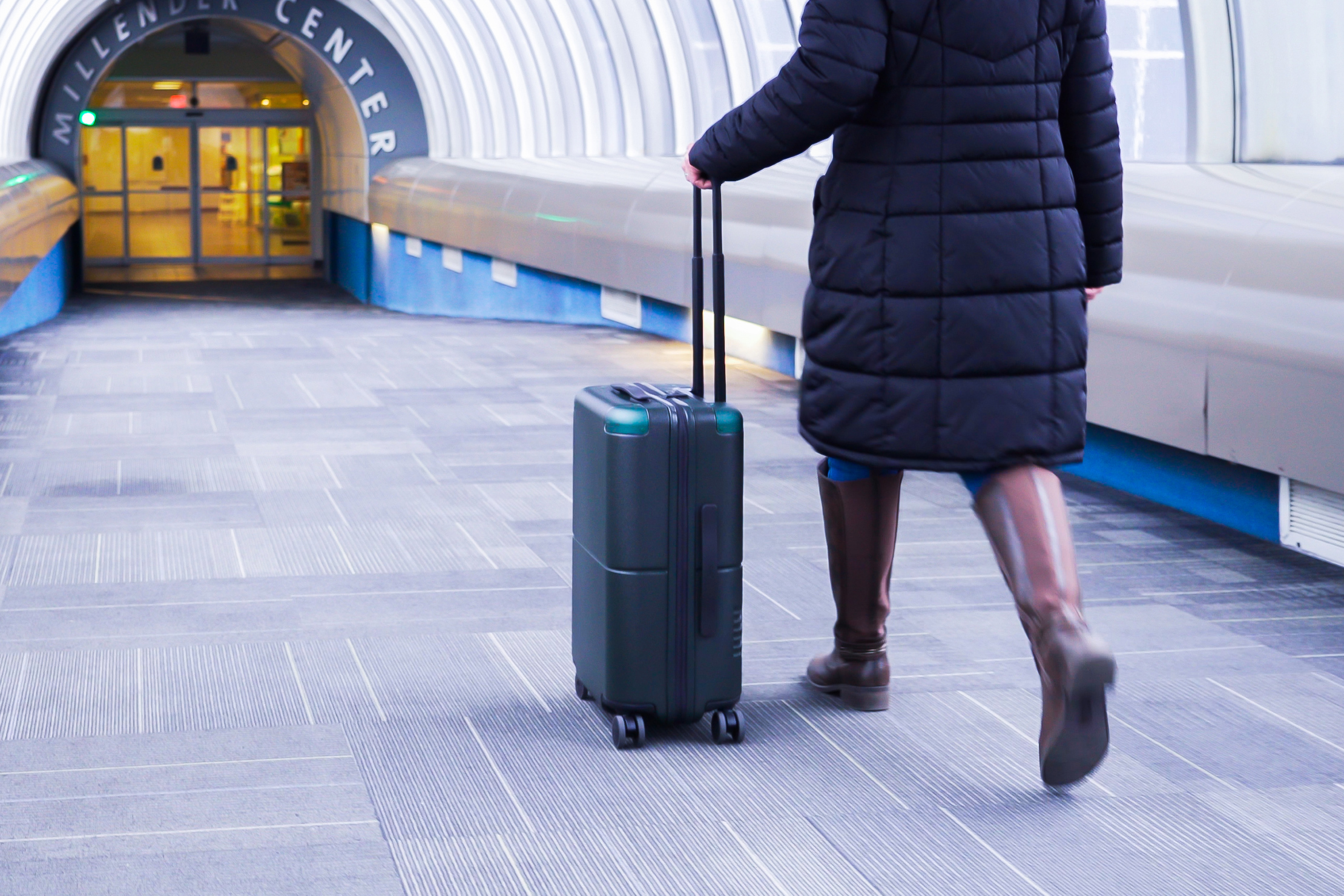
Because it’s balanced on four wheels and has a symmetrical shape, it stands fine on its own, whether next to a table at the airport cafe or in the waiting area. It’s even sturdy enough that you can use it to rest your feet if you put the handle down. Maybe you don’t want to be “that” traveler, but we’ve all been there after a long walk from the hotel or even the economy parking lot.
When you’re ready to roll, the handle extends about 20 inches above the 42L bag, but you can shorten it to just 11 inches or stop at one of the 20(!) places in between. We can’t express how nice it is to find the exact sweet spot for your height instead of choosing between slightly too short or slightly too tall, as you must on many suitcases.
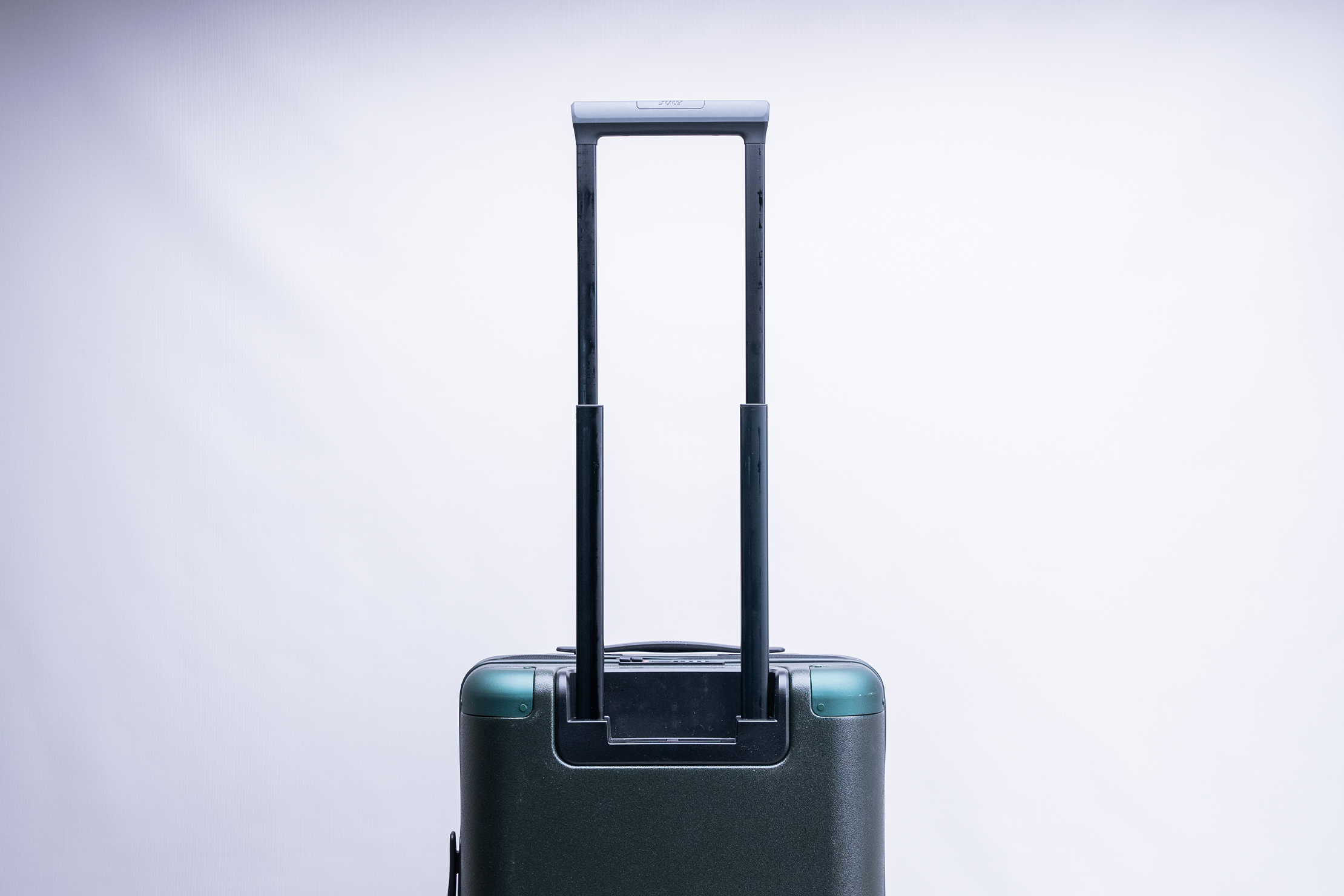
The handle flexes a little as you move around, but not so much that we feel like it will bend or break anytime; more just because it can obviously move up and down, so it’s not cemented into place.
Inside The Carry On Luggage
One thing to know about the July Carry On is that there aren’t any exterior pockets or compartments. Whatever you need to access at the airport, you’ll have to unzip it completely to get it. Truly, you can’t even just open it a tad and squeeze your hand in unless you can feel what you’re grabbing since the opening is only about as deep as your fingers.
So, we’ll take a moment to recommend you bring along a sling or a travel daypack when you leave home. A smaller bag like that keeps your essentials more accessible, so it’s a great place for your phone, travel wallet, keys, and passport to have them readily available for whoever needs to see them. After all, you don’t want to be opening your suitcase on the floor outside security, digging for your passport just so you can show the officer and get in line, do you? (In case you’re wondering, for the sake of your fellow travelers who will have to step over you to enter the queue, the answer is always no.)
So, go ahead and flip that TSA-safe lock, watch the zipper pulls pop out, and unzip it to get into the main compartment. While you can technically leave the zipper heads anywhere along the track, you have to click them into the lock at the top (near the telescoping handle) to take advantage of that feature. It’s also good to note that if you want to make sure not to spill loose clothing out of your suitcase (assuming you’re not using packing cubes, which we would always recommend you do), you’ll want to have the handle side of the bag down and then open up the other side, as it has a zipper mesh panel holding any gear on that side in place.
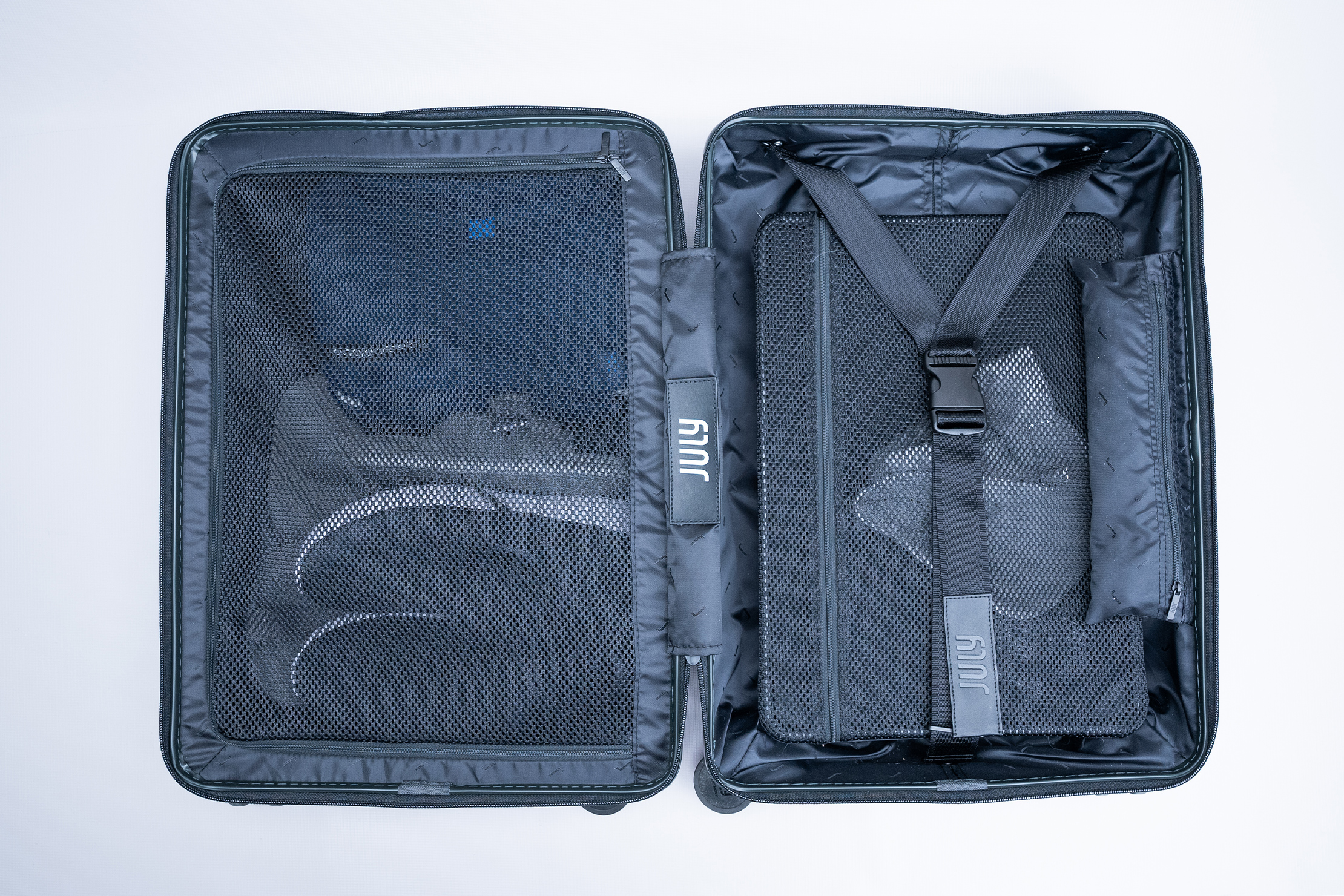
Since the mesh spans this side’s entire height and width, we find it a great place to put bulkier gear that could be more difficult to squeeze alongside your clothing, like travel shoes and a toiletry bag. It’s a nice open space with no other organization inside. If you don’t put anything else here, it’s a good place for stashing footwear because you don’t have to worry about dirt and grime getting on your other items. However, if you put other things in the same spot, just use a shoe pouch or a plastic bag to keep your dirty duds from contaminating everything else. You could also use this space for your packing cubes and put bulkier gear on the other side, if you prefer, of course.
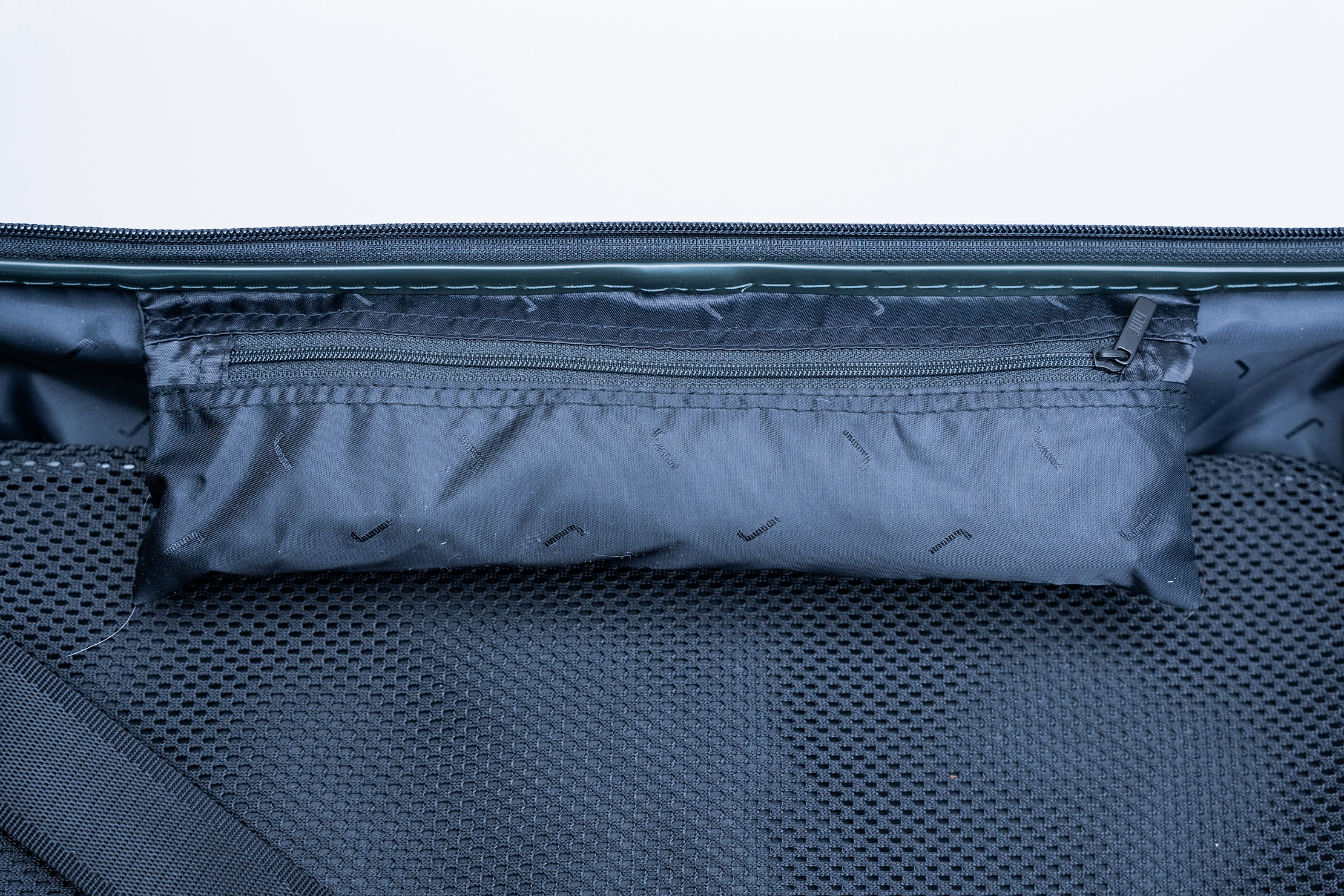
The entire interior of the carry on is nylon, which July says is water-resistant and stain-proof. At the very least, it’s black to hide any stains and soft and satiny to the touch. The same material is used for the laundry bag hidden in a zipper pouch along the right side of the bag. The laundry bag itself zips closed and includes a snap that connects below the built-in pouch to keep it out of the way on the bottom of the bag. While it’s nice to have, we are always left wondering how to fit it in when you’ve stuffed it full at the end of the trip. Clearly, some of your clothing will be out of your packing cubes and in the laundry bag instead, but unless you’re Kon-Mari rolling your dirty socks, there’s a good chance it will take up more room than the cube it’s replacing.
There are a few leather accents in here, too, complete with more July branding. There’s a patch of leather with the name stamped in white on the hinge between the two sides of the suitcase and another patch on the compression strap with the name debossed. You won’t be able to forget you have a bag from July, that’s for sure.
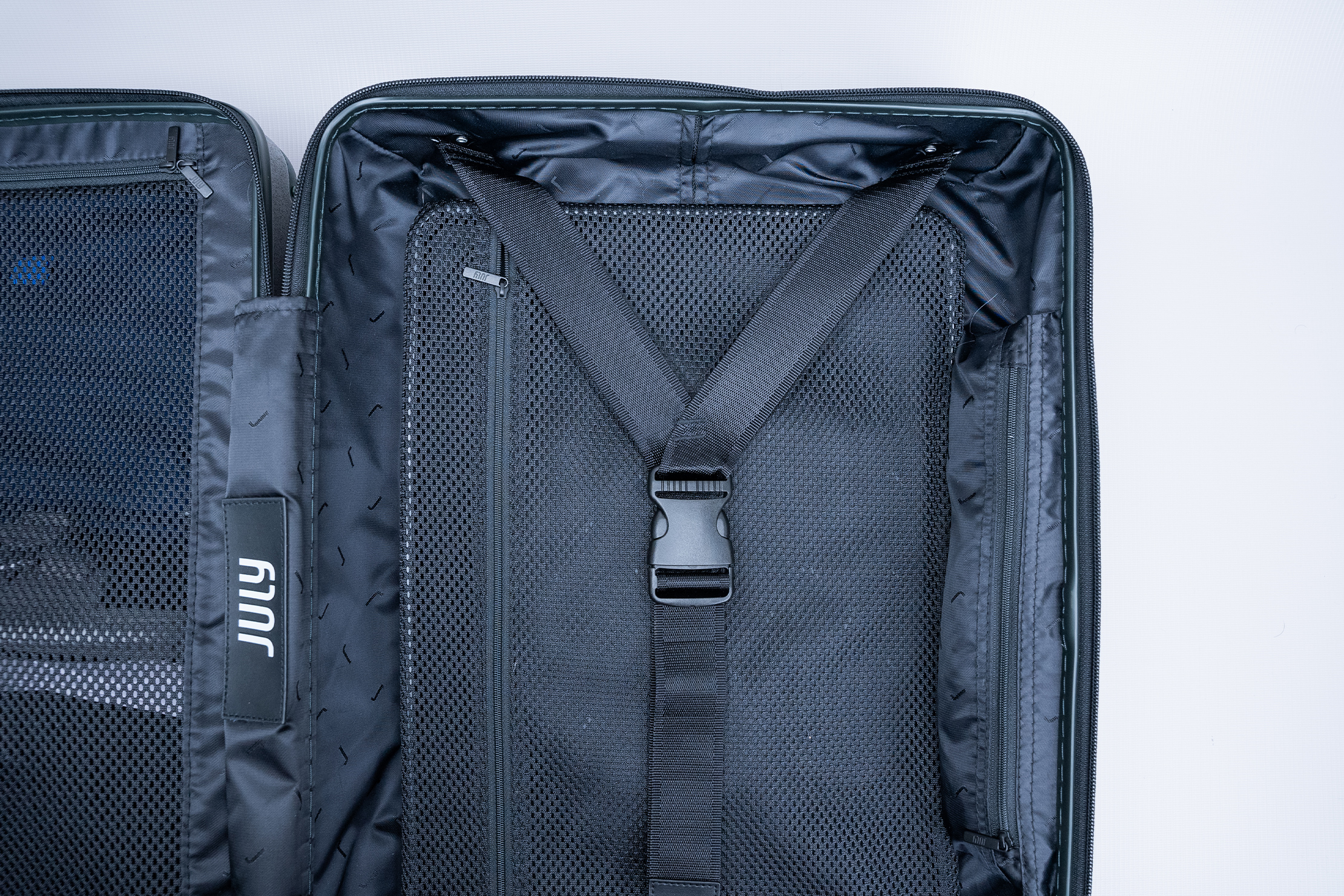
Let’s talk about that compression strap, though, shall we? It’s Y-shaped, with a single strap reaching toward the bottom of the bag and two straps angling to the top. There’s a buckle where the two meet.
The Y-shape may sound a little odd to you, but it goes over the top of a compression panel to hold your gear in place. It’s not just a straight panel, though: it’s nylon on the back and a large mesh zipper pocket on the front with a metal frame around the edge. Inside, you’ll find a smaller mesh bag with the USB cord that charges the battery bank, though you don’t have to keep it there. If you like to bring a travel journal or magazines, or you need to carry documents, this panel pocket could be a good place to slip them. Otherwise, you could use it for smaller, flatter gear like a travel hat, socks, and underwear. Frankly, we didn’t find much use for it, and you can slip it off the strap if you prefer, but then you’ll just have a Y-shaped compression strap sans panel, which may not work as well for holding your gear in place, depending on how you pack it.
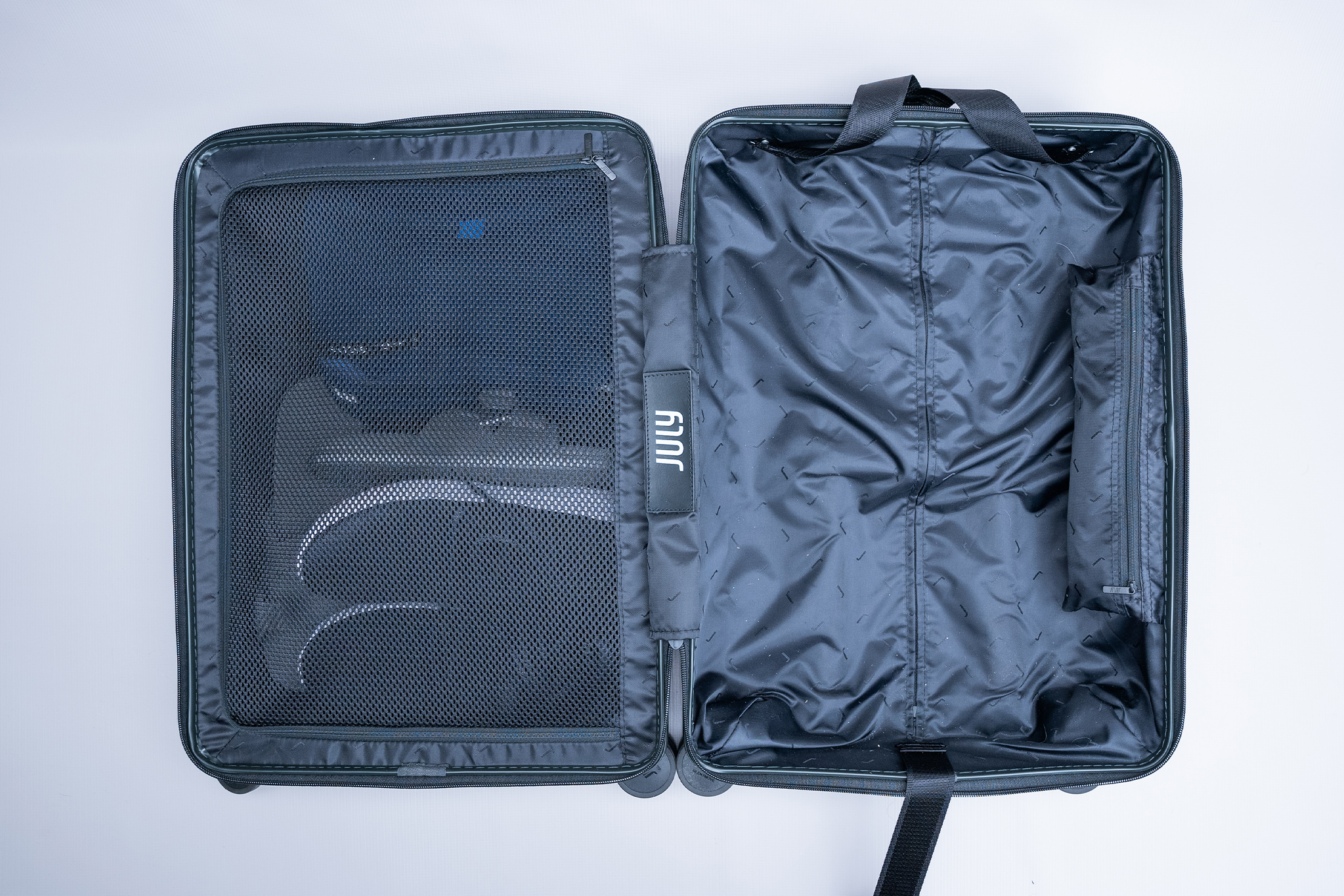
The capacity is the same on both sides, although there are ridges where the telescoping handle runs along the back panel that take up some space on the side with the compression panel. That’s an issue with—dare we say—every piece of rolling luggage, however, since that handle has to go somewhere. Creative packers put the space to good use by using the tunnel for socks or a skinny packing cube, and we don’t have much of a problem with it there.
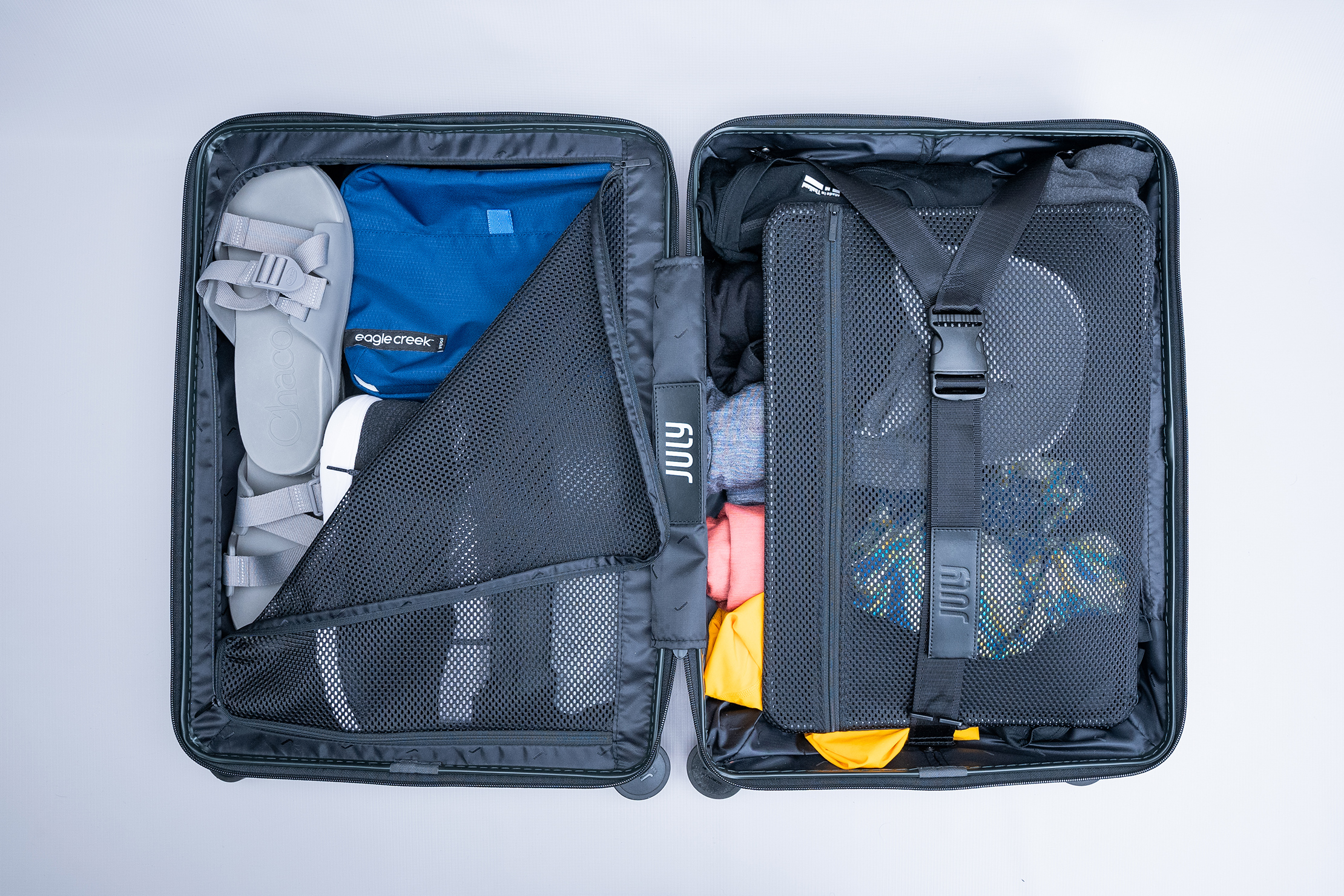
The July Carry On does suffer from an issue we find on many pieces of hard-sided luggage—since the sides are identical, it requires a little more finesse in packing to make sure you don’t overload one side. It’s not always apparent until you go to zip it up, and we found ourselves having to redistribute items a few times as we got the hang of what fit where. Many pieces of soft-sided luggage have a much shallower lid, with the majority of the capacity in the bottom bucket so that you know exactly how much space you have to fill. Also, there’s no expansion/compression zipper on this Carry On, so you’ll either have to sit on it to try and squeeze in more gear or make sure you don’t overload it. We recommend the latter, mainly because we’re minimalist packers, but also because it will save you money on souvenirs you don’t actually need.
Usage Timeline
Condition: Excellent
- You can get it in so many different colors
- Interested to put the built-in power bank to the test
- Includes nice organizational options
Condition: Excellent
- The compression panel can get in your way, depending on the items you pack
- Sometimes you have to redistribute gear between the sides if you start to overpack
- Dirt and scuffs show fairly easily, depending on the colorway
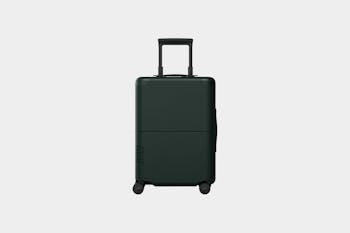
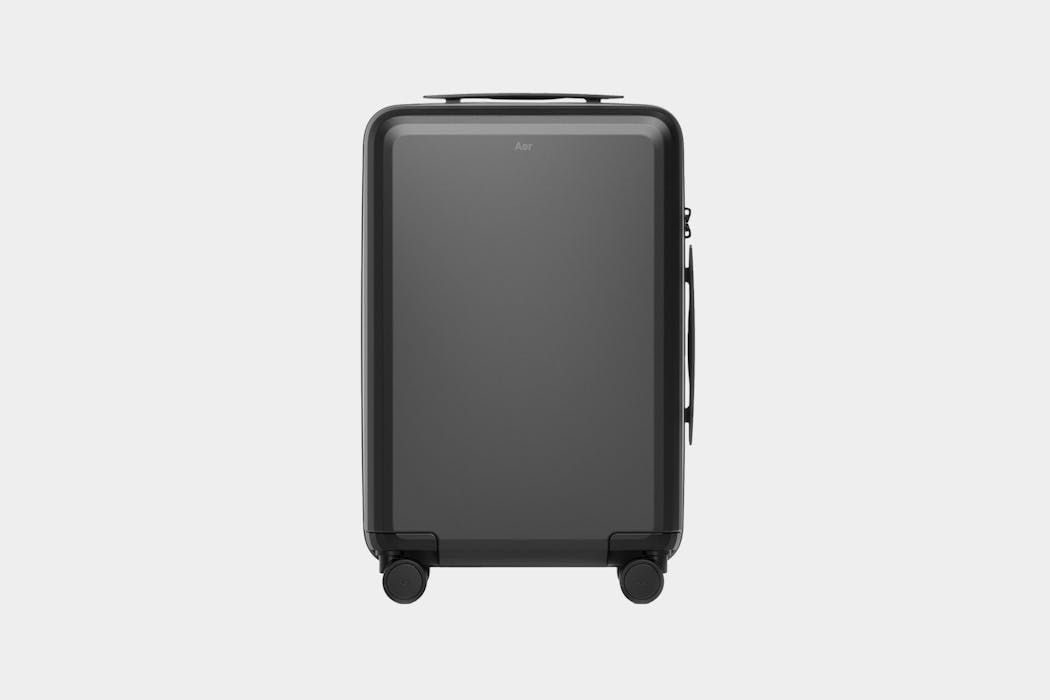
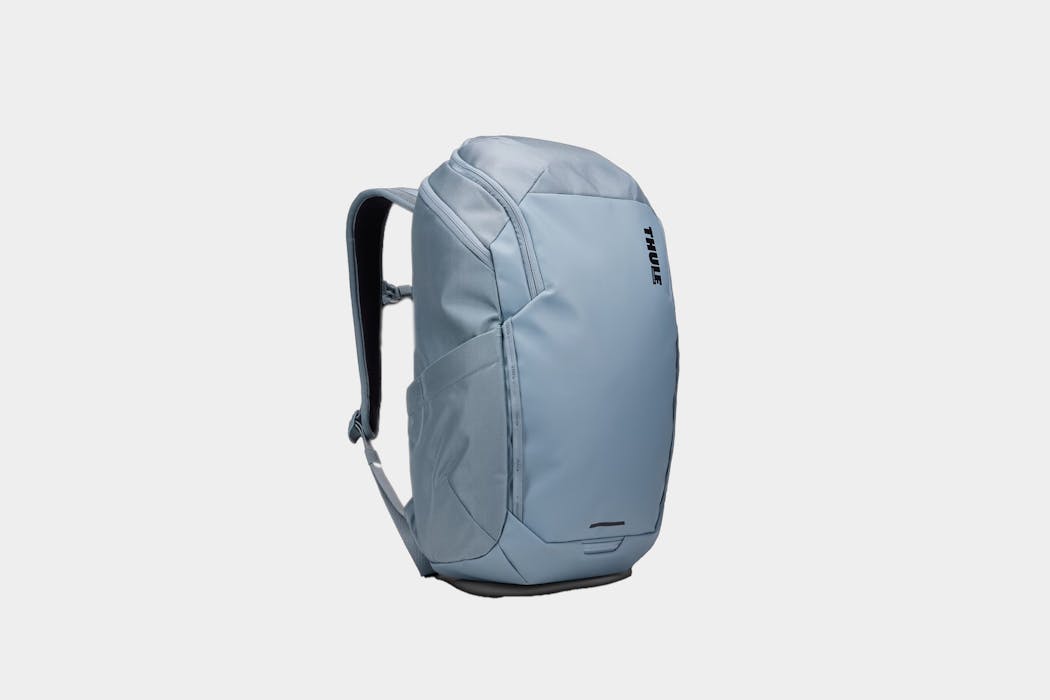
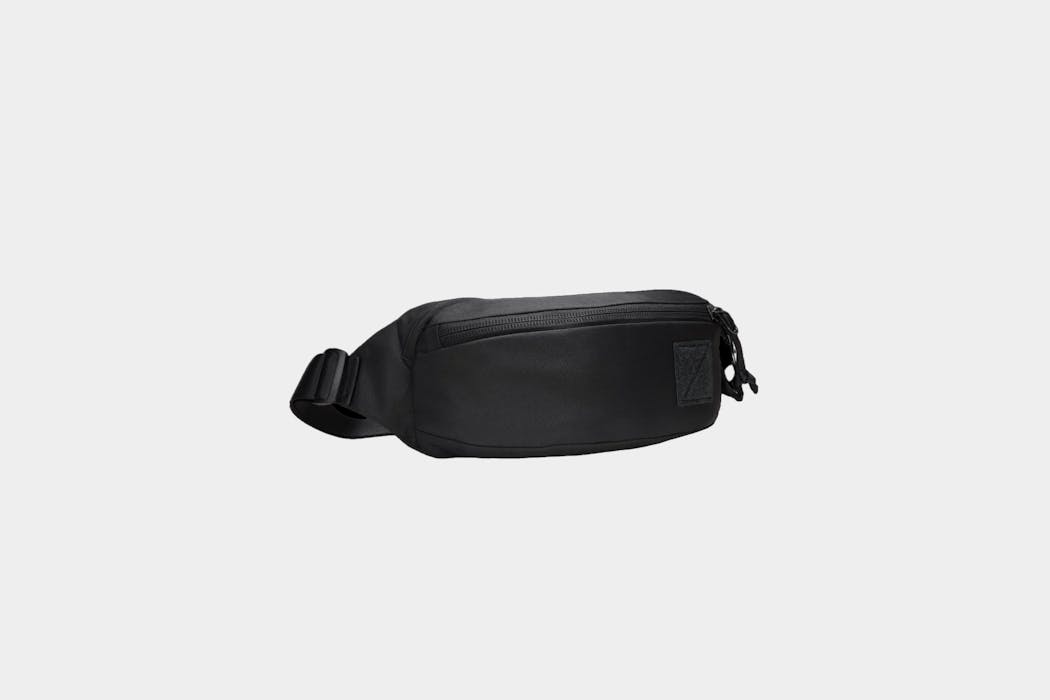
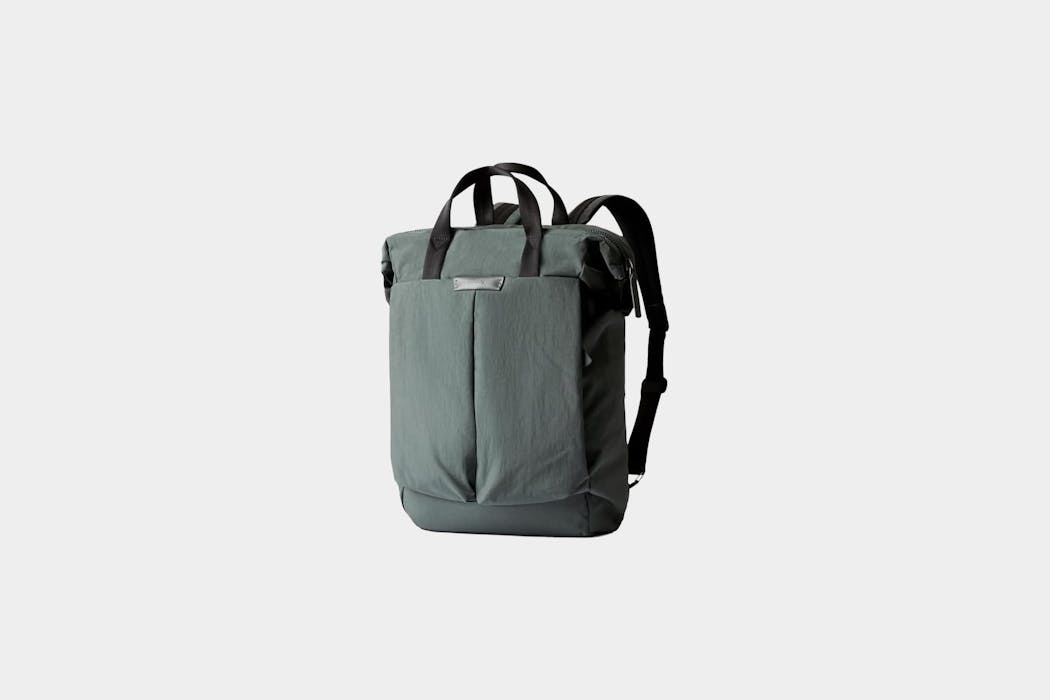
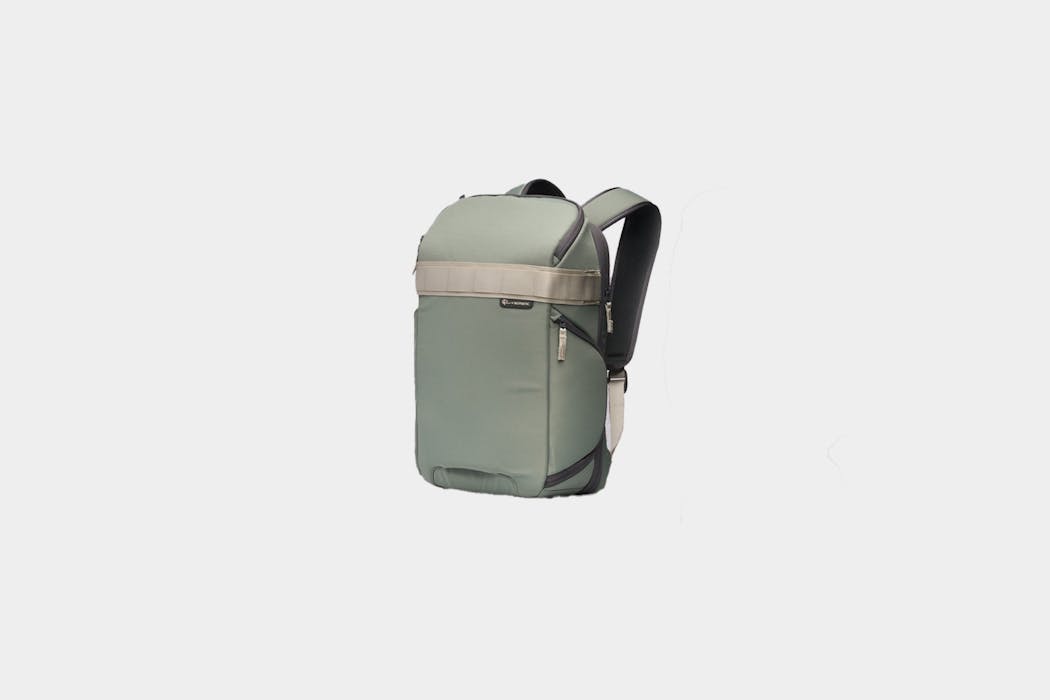
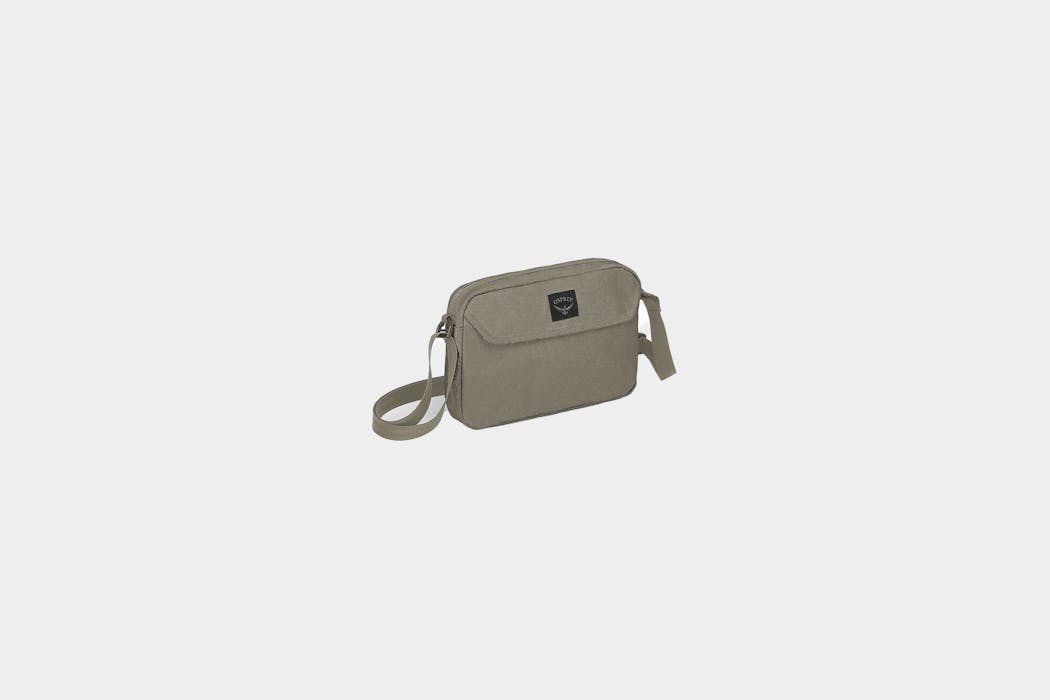
Get your questions about the July Carry On answered from our team and the Pro Community right here on the page. Plus, join discussions with other members about gear, guides, and more.
Join Pack Hacker Pro or, Sign In